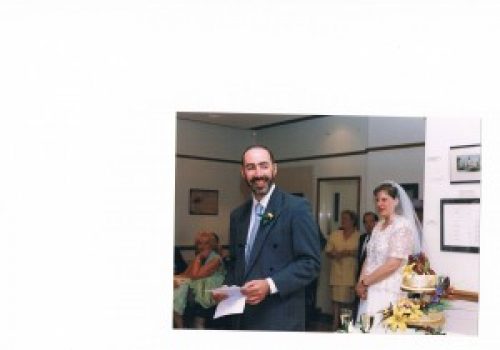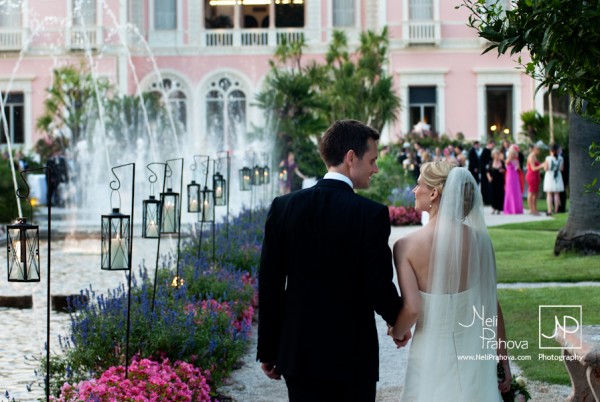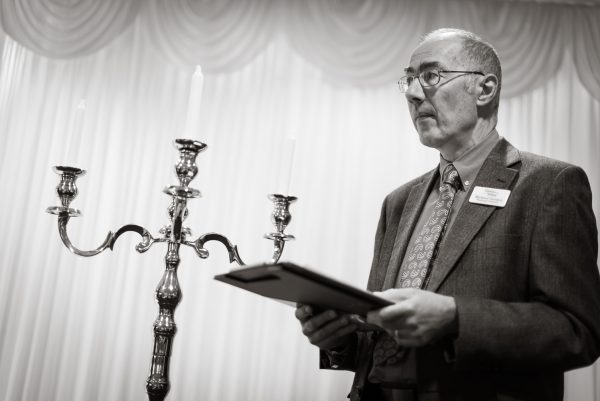
by Michael | Jul 9, 2018 | Blog
Weddings and public speaking go together. And stage-fright is often an (unwelcome) part of the process.
In fact, according to statistics, many people fear delivering a speech more than they fear death!
The likelihood is that you will be called upon to write and deliver a speech at least some time in your life. It may be for a business presentation or else for a family event. It could be in front of a handful of people or before a whole crowd. However, it is a skill that is well worth mastering.
My story
Only a few years ago, I needed persuasion before I would even enter a room to network. After a while, I became more comfortable. Then I was persuaded to give a 10-15 minute presentation about my business in front of 18 people. That was a step too far! I was so nervous that I gestured wildly and shattered a glass of water. I became memorable, but not at all for the right reasons!
Now, I willingly and confidently address small crowds (I haven’t got to the 1000s stage, but I hope that may happen). Recently, I was put in front of 200 guests at the Savoy, and it wasn’t an issue. Indeed, as a civil celebrant, my success depends, at least in part, on my presentation skills.
I’d therefore like to pass on knowledge and tips that I have acquired, so that the potential ordeal of public speaking can become much more palatable.
Focus
I am going to concentrate here on celebratory-type ceremonies. Essentially, we will need to focus on content and delivery. Here are some thoughts as a starting-point.
Tips
- It is better to be brief than over-long – your audience may be hot, tired, hungry
- If you can deliver humour successfully, do so; if not, keep those jokes to a minimum!
- Avoid too many “in-references” – at a wedding half the guests may not know anything about one of the newly-weds, so in-jokes can fall very flat and exclude whole groups
- Use a script or, better still, numbered 3 x 5″ cards. (Only very accomplished, experienced speakers can deliver off the cuff). Rehearse so that you can deliver your speech with only occasional reference to your notes. Eye contact with your audience is very important, if you are to engage with them
- There may be a good sound system, but ensure you can be heard loudly and clearly – you can help that by not burying your head in your notes and by speaking s-l-o-w-l-y ( a lot slower than you may expect!)
- Avoid saying anything controversial, whether about personalities in the room or about politics – the idea of the proceedings is to create a wonderful atmosphere, not to score points!
- Use anecdotes, but ones that fit in and are relevant. Avoid meandering ‘shaggy dog’ stories that may lose your audience. If you are not good at crafting a good story, maybe you can get someone to help you
- Delivery should be slower, rather than faster, and do not be afraid of a silence, if appropriate. Try not to address one area of the room only, but make everyone feel included
If you need any more advice, then there are professional presenters out there who can help. And I would be happy to help too.
Remember that it is a privilege to be asked to give a speech, so be grateful. Remember your audience at all times. Oh, and, however nervous you may be, save the alcohol for afterwards!
Enjoy the occasion.

by Michael | Apr 17, 2018 | Blog
So your mind is on your approaching big day? The wedding ceremony is crucial (but you will be in safe hands with your civil celebrant).
However, once that part is over, what happens next?
Don’t fret! If you have hired a toastmaster, they will advise you. As should your (or the venue’s) Event Planner. However, you’ve arrived at my blog and I can offer you a guide to put your mind at ease.
Arrival
You may form part of a receiving line to greet the guests. It will normally consist of the bride’s parents (the hosts), the groom’s parents, bride, groom and, if desired, attendants (in that order). (If it’s a smaller reception, it might just be you.)
This can take quite a time, and it may be preferable to dispense with this – PROVIDED that you (and, possibly, your parents) circulate during the meal. Remember, everybody will want to congratulate you!
The Meal
At a sit-down reception, the bridal party occupy the top table. Traditionally, they should be (from left to right as viewed by the guests): chief bridesmaid, groom’s father, bride’s mother, groom & bride, bride’s father, groom’s mother and best man.
There ought to be a table-plan and/or place-cards for guests. Obviously, ensure there are enough chairs available for all!
Thank you
If it’s not too formal, or a buffet, you and your new spouse will circulate, as I’ve suggested, briefly thanking guests for coming. You return to the table for the cake-cutting, speeches and toasts.
Cutting the cake
The bride places her hand over the groom’s and together they cut the cake. (It may be worth cutting it in advance, if the icing is very hard!) Someone else will cut the cake up and distribute it to everybody. (You may want to send some pieces to absent friends, so reserve these.) You traditionally keep the top tier (for the christening of the first child).
Speeches and Toasts
Ideally, they will not be too long! Incidentally, I can offer some tips on presenting (please see my blog: https://vowsthatwow.co.uk/delivering-a-wedding-speech/) .
The bride’s father will toast the couple; the groom replies on behalf of himself and the bride (thanking the bride’s parents for the wedding, the guests for attending and for their presents and toasting the bridesmaids); the best man replies on behalf of the bridesmaids and reads out any messages from absent friends.
At the end
You normally leave first (announced by the best man).
Job done!!
by Michael | Oct 7, 2014 | Blog
Weddings and public speaking go together. And not everybody likes the idea of speaking in public.
In fact, statistics indicate that many people fear delivering a speech more than they fear death!
The likelihood is that most people will be called upon to write and deliver a speech at least some time in their life. It may be for a business presentation or else for a family event. It may be in front of a handful of people or before a whole crowd. However, it is a skill that is well worth mastering.
I wrote about how to make a groom’s speech, and this provoked some interest. So here is some general advice that may be useful.
My story
Only a few years ago, I needed persuasion before I would enter a room to network. When I had to give a 10-15 minute presentation about my business in front of 18 people, I was so nervous that I gestured wildly and shattered a glass of water. I became memorable, but not really for the right reasons!
Now, I willingly and confidently address small crowds (I haven’t got to the 1000s stage, but I hope that may happen). Indeed, as a civil celebrant, my success depends, at least in part, on my presentation skills.
I’d therefore like to pass on knowledge and tips that I have acquired, so that the potential ordeal of public speaking can become much more palatable.
Focus
I am going to concentrate here on wedding/vow renewal-type ceremonies. Essentially, we need to focus on content and delivery. I would refer you to a blog I wrote specifically on content (https://vowsthatwow.co.uk/?p=519), so I only need to add a little to that now.
Tips
- It is better to be brief than over-long – your audience may be hot, tired, hungry
- If you can deliver humour successfully, do so; if not, keep those jokes to a minimum!
- Avoid too many “in-references” – at a wedding half the guests may not know anything about one of the newly-weds, so in-jokes can fall very flat – and exclude whole groups
- Use a script (only very accomplished, experienced speakers can deliver off the cuff), but rehearse so that you can deliver your speech with only occasional reference to your notes. Eye contact with your audience is very important, if you are to engage with them
- There may be a good sound system, but ensure you can be heard loudly and clearly – you can help that by not burying your head in your notes and by speaking s-l-o-w-l-y ( a lot slower than you may expect!)
- Avoid saying anything controversial, whether about personalities present or about politics – the idea of the proceedings is to create a wonderful atmosphere, not to score points!
- Use anecdotes, but ones that fit in and are relevant. Avoid meandering ‘shaggy dog’ stories that may lose your audience. If you are not good at crafting a good story, maybe you can get someone to help you
- Delivery should be slower, rather than faster, and do not be afraid of a silence, if appropriate. Try not to address one area of the room only, but make everyone feel included
If you need any more advice, then there are professional presenters out there who can help.
Remember that it is a privilege to be asked to give a speech, so be grateful. Remember your audience at all times. Oh, and, however nervous you may be, save the alcohol for after wards!
Enjoy the occasion.
Michael Gordon can help prepare and conduct a tailor-made civil ceremony in or around London or, indeed, in Europe.
by Michael | Sep 30, 2014 | Blog
One of the highlights of a wedding reception is – or should be! – the speeches.
There are normally three of these, offered by the father of the bride, the best man and the groom.
The father’s speech
Although he may well have financed much, or all, of the event, the bride’s father will only be expected to make a short speech. He may make some (flattering!) reference to the groom and his family, but his job is really to thank everyone for coming and to invite them to have a wonderful time.
The Best Man’s speech
The Best Man has unparalleled knowledge of the groom, and will normally use it to great advantage. He will relate (hopefully!) funny anecdotes that indicate some character traits that not everybody may realise – or, even better, that they do all recognise! The speech should last between about five and ten minutes, depending.
The Best Man (and all speech-makers) should steer clear of politics, insults, bad language and religion. I plan to do another blog on the Best Man’s speech.
The Groom’s speech
Just as one hopes the Best Man’s speech will shed light on the groom in a witty and entertaining manner, so the Groom has his chance to talk about his new wife. He will alo want to thank people who have made the day possible (including the guests), but he will probably want to demonstrate his affection and express his emotions in some way.
Elements
It is vital that the speech is not too long. Ten minutes should be quite enough. It should focus on the bride – what she means to him, possibly how bride and groom met and maybe an anecdote that shows why he chose her. Vitally, it should be sincere.
Of course, the Groom needs to thank everyone who contributed to the wedding (not just financially!). So it will be the parents of the bride, the participants (bridesmaids, ushers, etc.) and the guests. Absent friends may be mentioned here. Without overdoing it, a bit about the best man could go in (preferably, including a story about something he and the Groom both got up to once).
Delivery
It’s unwise to rely on memory (especially on such a day), but reading out from a long script can be boring. The Groom should use notes, and try and make eye contact with his audience as much as possible.
However, when talking about his new wife, what attracted him, why he loves her, an interesting/humorous episode together, the Groom can address his remarks directly to her. A compliment is unlikely to be taken amiss (and the guests will love it too!).
It’s important to try and vary delivery, so it is not monotonous.
Speed
A good tip, however much nerves may be jangling, the Groom should take his time, and avoid mumbling or gabbling. He should speak loudly and clearly. People will really want to hear what he has to say, so it’s not good to frustrate and deprive them!
Humour
Starting with a joke is fine. However, the joke must be funny – and not crude or offensive. Rather than telling lame jokes, it may be better to leave them out altogether.
If the groom is determined to tell a joke, it should be directed gently at the best man (NOT at the new in-laws, unless it is definitely appropriate and they will be OK with it! Startting a marriage off on the wrong foot is not advisable…).
I took a great risk at my wedding, because I chose to be quite rude about my new wife. I got away with it (although I am still suffering the fall-out to this day!) because my comments were funny (no, really!), but it’s a dangerous game to play.
Finish
When the Groom has done what he set out to achieve, he should stop while he’s ahead. He can propose a toast to the bridesmaids and/or his wife and then pass the microphone to his best man.
Notes to Grooms
- Don’t forget to thank your in-laws if they financed the affair. Thank your father-in-law for his speech (and for producing such a wonderful daughter). Thank everybody on behalf of your wife too. Make mention of guests from afar, or special guests, your in-laws and your own parents. Don’t thank the caterers, florists etc. who have been paid for their services. Try not to spend too long thanking people.
- Don’t read out long lists.
- Resist the temptation to get blind drunk before your speech!
- Check beforehand with your best man that there’s no clash or excessive overlap/repetition in what you are both going to say in your speeches.
Prepare thoroughly beforehand, remember the tips about delivery, and you will make a wonderful speech that you will enjoy making and your guests will love hearing.
Michael Gordon can help prepare and conduct a tailor-made civil ceremony in or around London, or, indeed, Europe.

by Michael | Jul 16, 2013 | Blog
Many people fear delivering a speech more than they fear death! (Apparently, this is a statistical fact!)
The likelihood is that most people will be called upon to write and deliver a speech at least some time in their life. It may be for a business presentation or else for a family event. It may be in front of a handful of people or before a whole crowd.
My credentials
Only a few years ago, before I became a civil celebrant, I was terrified at speaking about my own business in front of a dozen or so people – not any more. I can modestly claim to have brought the house down on two occasions with a wedding speech; I now willingly and confidently address small crowds (I haven’t got to the 1000s stage, but I hope that may happen).
Focus
I am going to concentrate here on wedding/vow renewal-type ceremonies. Content is another matter, but for now I really want to cover delivery.
10 Tips
- It is better to be brief than over-long
- If you can deliver humour successfully, do so; if not, keep those jokes to a minimum!
- Avoid too many “in-references” – at a wedding half the guests may not know anything about one of the newly-weds, so in-jokes can fall very flat – and exclude whole groups
- Use a script (only very accomplished, experienced speakers can deliver off the cuff), but rehearse so that you can make your speech with only occasional reference to your notes. Eye contact is very important
- There may be a good sound system, but ensure you can be heard loudly and clearly – you can help that by not burying your head in your notes and by speaking more s-l-o-w-l-y than you would expect
- Avoid saying anything controversial, whether about the families present or about politics – the idea of the proceedings is to create a wonderful atmosphere, not to score points or secure cheap laughs!
- Use anecdotes, but ones that fit in and are relevant. Avoid meandering ‘shaggy dog’ stories that may lose your audience. Be very sure whether that embarrassing story about the bride will be well-received!
- I stress that delivery should be slower, rather than faster, and do not be afraid of a silence for effect, if appropriate. Try not to address just one area of the room, but make everyone feel included. Smile – at least, at the beginning and end.
- If very nervous, try a few deep breaths and no (or minimal!) alcohol – and remember, the guests will be on your side, and willing you to do well
Remember that it is a privilege to be asked to give a speech, so be grateful. Remember your audience at all times. Oh, and, however nervous you may be, save the alcohol for afterwards!
Enjoy the occasion.



